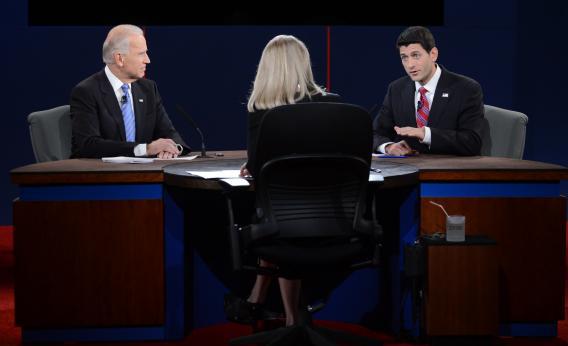I’ve got five fingers on each of my hands, and five seriously questionable arguments advanced by the vice presidential contenders earlier tonight:
1. Joe Biden on unemployment: “We can and we will get it under 6 percent.” I hope we can and I hope we will, but there’s nothing the Obama-Biden administration has put on the table that would accomplish this on any reasonably short time frame. Indeed, even the White House’s own claims about its American Jobs Act don’t support a change on that scale. Most likely the only thing that could help accomplish this would be a robust commitment to expansionary monetary policy, but again even the Fed’s top dove Charles Evans isn’t talking about policy on the scale that would be needed.
2. Paul Ryan on unemployment: Cites rising unemployment in Scranton and says “that’s how it’s going all across America.” It’s true that the unemployment trend in the Scranton area is upward, but that’s not how it’s going all across America. The unemployment rate is falling and the economy is adding jobs. In fact, year-over-year unemployment is down year-on-year in 325 of 372 metropolitan areas.
3. Joe Biden on autos: “I know [Mitt Romney] had no commitment to the automobile industry … he said ‘let it go bankrupt.’ “ Mitt Romney absolutely wrote a 2008 New York Times op-ed that was given the headline “Let Detroit Go Bankrupt.” This has been the fodder for dozens of Democratic attacks, but those of us who write for a living know that nuance is often lost as editors seek to give something an eye-catching headline. The column called for a “managed bankruptcy” in which the federal government would “provide guarantees for post-bankruptcy financing and assure car buyers that their warranties are not at risk” while restructing GM and Chrysler’s debts and labor contracts. This is essentially what the Obama administration did in their auto rescue.
4. Paul Ryan on partisanship: In 2009-10 “they had the ability to do anything of their choosing.” That’s nuts. In the real world, a minority of 41 senators can block almost any legislative measure. What’s more, even smaller numbers of senators can create massive delays in the legislative process. The Republican caucus in 2009-10 was unusually aggressive in deploying these tools and it had a major impact on the course of legislation. GOP filibusters blocked the DREAM Act, kept Federal Reserve and Federal Housing Finance Agency offices vacant, killed hope for climate change legislation, blocked a number of fiscal stimulus measures, and so forth.
5. Martha Raddatz on entitlements: “Both Medicare and Social Security are Going Broke.” This poor framing of a question about major federal budgetary commitments (among other things, it left out the crucial question of Medicaid) is pretty misleading. Social Security benefits are driven by a statutory formula and the program is not allowed to pay out more money than exists in its notional trust fund. That means potentially large cuts at some future time, but not any kind of liquidation of the program. Medicare’s financing is in some ways more complicated and in other ways simpler. When Congress wants to—as it did when the Bush administration and the congressional GOP created the prescription drug benefit—it can just spend borrowed money on Medicare. The question of going broke doesn’t really arise.
